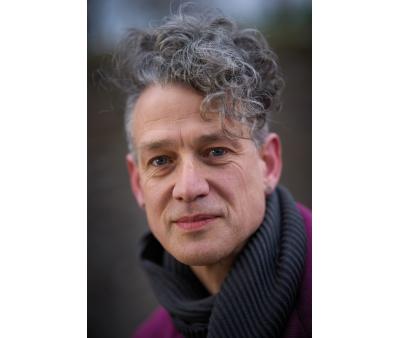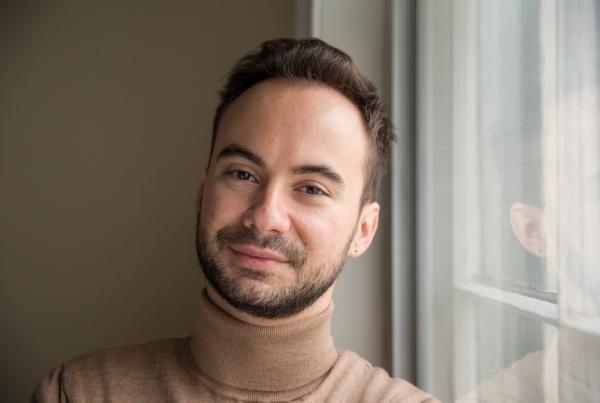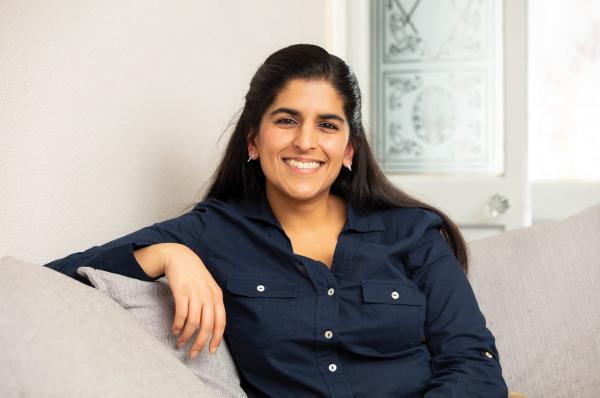A panel of LGBTQIA+ members reflect on the progress made in the past 12 months, while speaking to Ella Braidwood

Reflections 2021 - 2022
Having a diverse and inclusive physiotherapy profession is key to not only improving the wellbeing and work performance of staff – it also means better care for patients from all walks of life. Over the past year, the CSP has taken steps to make the sector more inclusive. This has included publishing its equity, diversity and belonging strategy last October, which stands against discrimination of all kinds.
Physiotherapy staff and students who are lesbian, gay, trans, queer, intersex and asexual (LGBTQIA+) may face additional barriers in the workplace from stereotyping to harassment. The CSP’s LGBTQIA+ network, which works alongside the BAME and DisAbility networks, is crucial to ensuring that every member feels represented – and listened to – within the profession.
Our discussion panel was made up of:
- Stephanie Land (she/her), a specialist MSK physiotherapist at NHS Lothian, based in Edinburgh
- Antoine Awad (he/him), a physiotherapy student at Brunel University London and an equity, diversity and belonging officer on the CSP’s Student Reference Group
- Holly Van Ristell (she/her), a specialist respiratory physiotherapist who is currently interim head of physiotherapy at Jersey General Hospital
- Kiran Ul-Haq (she/her), a rotational physiotherapist at Ipswich Hospital
- Louie Howie (she/her), a physiotherapy student at University of the West of England in Bristol
When it comes to LGBTQIA+ inclusivity, what progress has been made in the past year in the profession?
SL: There has been a huge change in the CSP. We have formed groups and our networks have had far more engagement with members. All the diversity network groups have increased their numbers and people are wanting to engage more in

inclusion issues. We’ve asked for more accountability and we’re setting the scene by saying, ‘This is where we’re at, and we’re trying to change things for the better for the next generation of physios’.
AA: Since joining the LGBTQIA+ network and putting myself forward in the Student Reference Group, I can definitely see the work being done. You see it being brought up in events, wherever you go you hear people talking about the equity, diversity and belonging strategy. People are opening up these conversations about what should be done and being proactive about it.
HVR: The pandemic showed a lot of the health inequalities. And it highlighted that there needs to be a bigger push to get more diversity. As a profession, I think the CSP quite rightly took on board that it’s not just access to healthcare, but it’s actually getting into the profession. It’s about encouraging people into it. The younger students are now more diverse than when I trained. Even within the separate specialities within physio, there is that drive to encourage that diversity. So the pandemic did, I think, have that positive influence on diversity and not just highlighting those inequalities, but also how we can address them.
KUH: I would agree with that completely. Certainly from my NHS trust’s perspective, we’re adapting to a more diverse range of students, including taking our policies into consideration, even in the more rural areas. It’s a really good thing.
LH: I started as a student in September 2019, and I knew there must be queer and trans physios out there, but I couldn’t see any. So when there was the first LGBT+ History Month Frontline edition last year, it was amazing. Just to see that, it

was fantastic. Someone on Twitter told me about the LGBTQIA+ network’s WhatsApp group – to see the discussions in that network, not just about gender and sexuality, but also about race and disability, and trying to do intersectional work.
It’s been really helpful.
I felt like I was the first person to talk to my lecturers about pronouns, and they were great anyway, but it made me feel confident to know there is stuff happening in the CSP, and that I’ve got its strategy in my back pocket. The CSP has done a lot of work, and it needs to keep on working, but it’s great and has made a massive difference.
What has been the impact of the CSP’s new equity, diversity and belonging strategy?
KUH: What I absolutely love about it is that, immediately, from the first words that are written, it is proactive in its nature. It is only in its infancy, and so it leaves room to create action. It’s a springboard from which to work off. That’s what I’m really excited about. It’s almost like a working document, so there will be room for changing it, which is fantastic.
HVR: The CSP advertised it really well. They engaged people in a really positive way and looked beyond the corporate, executive level of engagement. They did reach out and did seek the involvement of the diversity networks.
It did feel like they were listening to what was being said, and they did take note. Alex MacKenzie [the chair of CSP Council] was proactive in shouting about it happening and wanting to make a change. As Kiran mentioned, it is a working document so it’s going to change and move with the profession.
LH: It’s been great, especially the fact that it is intentional and tries to have ways of measuring progress. The challenge now is to make it work, to make people accountable, and actually make it work for all the members. It’s a great step in the right direction.
How has being part of the CSP’s LGBTQIA+ network, and any of its other diversity networks, supported you?
AA: Joining the network was helpful for me in really very simple ways, like in knowing what’s being done and what still

needs to be done. At the same time, in celebrating the things that have been achieved and in sharing resources from other members because I personally don’t know everything about every single topic. It helps expose you to different kinds of perspectives, it fills the gaps in your knowledge by listening to other people. It gives you a sense of community too, which is very important. When I feel like I’m the only one out there, it shows me that there are other people like me, who are being successful.
SL:
I joined the BAME and the LGBTQIA+ network following the murder of George Floyd in May 2020.
I felt really compelled to join them. I’ve been qualified for a long time, and I was aware of the networks, but I naively thought that I didn’t want to join and, actually, I wish I had earlier. They’ve been really supportive and you learn about issues you are maybe not aware of. If you’re going through something or want advice there is the WhatsApp group. As Antoine said, it gives a sense of belonging, because sometimes you do feel alone. The BAME and the LGBTQIA+ networks have been a fantastic support, and I’m truly grateful for them both. It’s great to see that CSP are recognising and learning about intersectionality, too, and that we’re not all monolithic: we exist in different ways.
KUH: Steph, it sounds like you’ve found your tribes! It is that kind of tribalism: it shows how communication and

interconnectedness can be utilised to push everything forwards and have a positive impact on the workforce. So that’s really nice to hear.
Have you seen any specific changes in your workplace or at university to embrace LGBTQIA+ inclusion?
HVR: Working in Jersey, given that it’s quite small, as an employer they are very open, very accepting and inclusive. It’s not an active process, it seems to be that it’s just the way that it is, and you’re accepted. A lot of it is because they try and encourage people to come and work here, so by doing that, inevitably, you do get a broader range of people.
But even noticing what friends are saying nationally, there is more of a drive to create this inclusive environment. Take maternity services, even the advertising they’re using now seems to be more inclusive, for example, with two mums or two dads. Something that we did in our organisation was putting sanitary bins into all the toilets, which seems really small but actually makes a massive difference. They didn’t even really advertise it, it just happened. Even that makes a difference to people feeling more comfortable.
LH: Holly, what you’re talking about with those changes, that is way ahead of what’s happening at my university. In physiotherapy, the case studies are starting to change and become more diverse. With toilets, there are some gender neutral toilets but not many. The architecture is quite old-fashioned. To change a curriculum is quite a slow process, and I’m interested in how the CSP can help that happen. Stuff is definitely happening on the small scale but how do we make it go deeper?
AA: Another thing that would be great, as Louie said, is reflecting diversity in the case scenarios that we get in the class. I don’t think I’ve ever had a case scenario that is, for example, a gay person or a trans person. Then we would have to show how we would adapt as students to these scenarios.
KUH: Something I have really noticed, particularly off the back of Covid, is it’s almost like the NHS has been forced to diversify in the way that it searches for staff, because there has been such a short number of staff available. When I first joined the NHS, it was really obvious how every resource was White, middle-class and heteronormative. But there doesn’t seem to have been an active engagement using inclusive language. I haven’t heard words like ‘“LGBT” or “diversity” being used within the workplace with the exception of by students coming through.
Why is all of this work to create an inclusive environment for everybody important?
SL: It’s given me the confidence to speak up at work and to discuss these issues. As we said earlier, being part of these networks, you learn loads and people are passing resources and you bring that into the workplace. It has helped me to be hopefully more inclusive and more aware of these issues. I think that’s really important because we’re a far more diverse society and our profession should reflect that. Hopefully, as others have said about the students coming through now, they are more diverse and that should translate into the workplace.
Hopefully then people from marginalised groups will feel safe coming to our services, because we know from previous research that many don’t feel adequately supported and seen in healthcare. Doing all this work will help, that that’s how I see it. At the end of the day, we’re here to help our patients and make sure everyone is getting good treatment and don’t feel left out, or marginalised, or discriminated against.
AA: I think it gives you this security and confirmation that it is okay to be who you are, whether now as a student, or later when I’m working. As Stephanie mentioned, it gives you this power to speak. This ability to speak is a journey and you achieve it once you feel safe and secure, which I’m still definitely in the early beginning of.
KUH: Feeling supported in your identity helps people who wouldn’t normally have the opportunities to progress because of the norms in society – what I mean by that is the privilege and the structural unfairness and systematic racism. That can go in all sorts of directions from being able to have more creative or diverse ideas, which can then have a positive impact in healthcare, to on a personal level with your patient by being able to really relate and communicate more effectively, to have that platform to recognise difference and that it’s okay to be different. It can facilitate that patient-practitioner relationship, which can have lasting impacts on healthcare going forward.
HVR: That is fundamentally it – because if you create an open work environment where people feel safe to be themselves, inevitably, you’re going to encourage them to work better. They’ll give a better service to their patients. Ultimately, that’s why we do this job isn’t it? It’s to care for patients. You can only do that when you feel comfortable in yourself, you can only give your best when you feel safe and you feel supported. Then that allows the patient to get better treatment and to get the treatment that they need, and they deserve. So I think that’s fundamentally what’s the most important thing.
What work is still to be done to ensure you feel supported in your own identities?
AA: I always think about change across two levels, interpersonally between us and then at a more systemic level. I believe that when change comes from within the system, it has a greater impact and then everyone in society has a change in their mindset. Just small initiatives, for example, like wearing a badge at work that has your pronouns on it. It’s a really small thing that doesn’t really require a lot of work but it propagates change way quicker within people.
LH: As a trans person, I’m met with a willingness to talk about pronouns and stuff, but I’m initiating the conversation. So it would be nice if everybody got ahead a bit, for example, if there were more gender neutral toilets, if there were more pronouns at the bottom of email footers. Like Antoine said, it’s small things.
HVR: It is those little things, isn’t it? It’s people initiating that conversation around pronouns or how you prefer to be addressed. If your staff are able to do that, then they’re better able to treat their patients who are, ultimately, potentially at the most vulnerable point in their life. If your staff members can’t advocate for them, or if they haven’t got an advocate for themselves, they’re not going be able to advocate for their patients are they?
KUH: I guess the changes that we’re trying to make are still within their infancy. If you’re trying to create societal change, healthcare is a fantastic place to start because people can usually be a bit more open to those cultural changes. It’s just simple things like having better signposting for LGBTQIA+ people, pronouns on badges as Antoine said, and education within work. For example, we should have more inclusivity training and recognise that those in the LGBTQIA+ community can have a different physiology.
What are your hopes for 2022 in terms of creating a truly inclusive profession?
SL: I’d like to see more visibility and role models. I definitely want to see, in the CSP boardroom, more representation from the diversity networks. I think it’s already happening, slowly but surely. Healthcare wise, more work needs to be done in terms of having the right training, having the right visibility, and accountability as well. Hopefully, with the work that we’ve done and with this increased allyship, people will be braver in speaking up and speaking out.
HVR: With leadership, I think it’s really important to have leaders that are visible and truly authentic, because that makes a bigger difference. If you have a diverse senior leadership team that obviously gives role models to younger professionals and staff coming through. I think there needs to be more work around collecting the right data and using data appropriately, because I think it’s only really now the CSP has started to collect diversity data. But it’s not just collecting raw data, it’s having feedback from students, having feedback from different levels of professionals and registered members within the CSP, who can then inform the strategy that we’re using.
LH: Instead of being reactive, the profession needs to be proactive. We’ve had an amazing year, and we need to keep going.
KUH: What I think is really important is that I see action. The strategy that has been produced by the CSP is a fantastic starting point, but the risk is that it then just becomes a tick-box exercise and nothing is actioned upon that. We need to really work from the ground up to create that action and to create it quickly. I really do think that that’s something that we can do, and I’m excited about it as well.
- Find out about our three diversity network groups, how they operate, and how to join them.
Number of subscribers: 1
